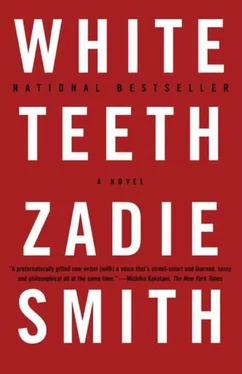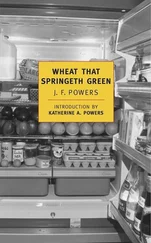The Truth entered the Bowdens that winter of 1906 and flowed through the blood stream directly from Ambrosia to Hortense. It was Hortense’s belief that at the moment her mother recognized Jehovah, Hortense herself became conscious, though still inside the womb. In later years she would swear on any bible you put in front of her that even in her mother’s stomach each word of Mr Russell’s Millennial Dawn , as it was read to Ambrosia night after night, passed as if by osmosis into Hortense’s soul. Only this would explain why it felt like a ‘remembrance’ to read the six volumes years later in adult life; why she could cover pages with her hand and quote them from memory, though she had never read them before. It is for this reason that any root canal of Hortense must go right to the very beginning, because she was there; she remembers; the events of 14 January 1907, the day of the terrible Jamaican earthquake, are not hidden from her, but bright and clear as a bell.
‘ Early will I seek thee… My soul thirsteth for thee, my flesh longeth for thee in a dry and thirsty land, where no water is.. .’
So sang Ambrosia as her pregnancy reached full term, and she bounced with her huge bulge down King Street, praying for the return of Christ or the return of Charlie Durham – the two men who could save her – so alike in her mind she had the habit of mixing them up. She was halfway through the third verse, or so Hortense told it, when that rambunctious old rumpot Sir Edmund Flecker Glenard, flushed from one snifter too many at the Jamaica Club, stepped into their path. Captain Durham’s maid ! Hortense recalled him saying, by way of a greeting, and receiving nothing from Ambrosia but a glare, Fine day for it, eh ? Ambrosia had tried to sidestep him, but he moved his bulk in front of her once more.
So are you a good girl these days, my dear? Gossip informs me Mrs Brenton has introduced you to her church. Very interesting, these Witness people. But are they prepared, I wonder, for this new mulatto member of their flock?
Hortense remembered well the feel of that fat hand landing hot against her mother; she remembered kicking out at it with all her might.
Oh, it’s all right, child. The Captain told me your little secret. But naturally secrets have a price, Ambrosia. Just as yams and pimento and my tobacco cost something. Now, have you seen the old Spanish church, Santa Antonia? Have you been inside? It’s just here. It’s quite a marvel inside, from the aesthetic rather than religious point of view. It will only take a moment, my dear. One should never pass up the opportunity of a little education, after all .
Every moment happens twice: inside and outside, and they are two different histories. Outside of Ambrosia there was much white stone, no people, an altar peeling gold, little light, smoking candles, Spanish names engraved in the floor, and a large marble madonna, her head bowed, standing high upon a plinth. All was preternaturally calm as Glenard began to touch her. But inside, there was a galloping heart-beat, the crush of a million muscles that wanted desperately to repel Glenard’s attempts at an education, the clammy fingers that even now were at her breast, slipping between thin cotton and squeezing nipples already heavy with milk, milk never intended for such a rough mouth. Inside she was already running down King Street. But outside Ambrosia was frozen. Rooted to the spot, as feminine a stone as any madonna.
And then the world began to shake. Inside Ambrosia, waters broke. Outside Ambrosia, the floor cracked. The far wall crumbled, the stained-glass exploded, and the madonna fell from a great height like a swooning angel. Ambrosia stumbled from the scene, making it only as far as the confessionals before the ground split once more – a mighty crack! – and she fell down, in sight of Glenard himself, who lay crushed underneath his angel, his teeth scattered on the floor, trousers round his ankles. And the ground continued to vibrate. A second crack came. And a third. The pillars fell, half the roof disappeared. Any other afternoon in Jamaica, the screams of Ambrosia, the screams that followed each contraction of her womb as Hortense pushed out, would have caught somebody’s attention, brought somebody to her aid. But the world was ending that afternoon in Kingston. Everybody was screaming.
If this were a fairy-tale, it would now be time for Captain Durham to play hero. He does not seem to lack the necessary credentials. It is not that he isn’t handsome, or tall or strong, or that he doesn’t want to help her, or that he doesn’t love her (oh, he loves her; just as the English loved India and Africa and Ireland; it is the love that is the problem, people treat their lovers badly) – all those things are true. But maybe it is just the scenery that is wrong. Maybe nothing that happens upon stolen ground can expect a happy ending.
For when Durham returns, the day after the initial tremors, he finds an island destroyed, two thousand already dead, fire in the hills, parts of Kingston fallen into the sea, starvation, terror, whole streets swallowed up by the earth – and none of this horrifies him as much as the realization that he might never see her again. Now he understands what love means. He stands in the parade ground, lonely and distraught, surrounded by a thousand black faces he does not recognize; the only other white figure is the statue of Victoria, five aftershocks having turned her round by degrees until she appears to have her back to the people. This is not far from the truth. It is the Americans, not the British, who have the resources to pledge serious aid, three warships full of provisions presently snaking down the coast from Cuba. It is an American publicity coup that the British government does not relish, and like his fellow Englishmen Durham cannot help but feel a certain wounded pride. He still thinks of the land as his, his to help or his to hurt, even now when it has proved itself to have a mind all of its own. He still retains enough of his English education to feel slighted when he spots two American soldiers who have docked without permission (all landings must go through Durham or his superiors) standing outside their consulate building, insolently chewing their tobacco. It is a strange feeling, this powerlessness; to discover there is another country more equipped to save this little island than the English. It is a strange feeling, looking out on to an ocean of ebony skins, unable to find the one he loves, the one he thinks he owns. For Durham has orders to stand here and call out the names of the handful of servants, butlers and maids, the chosen few the English will be taking with them to Cuba until the fires die down. If he knew her last name, God knows he would call it out. But in all that teaching, he never learnt it. He never asked.
Yet it was not for this oversight that Captain Durham, the great educator, was remembered as a fool bwoy in the annals of the Bowden clan. He found out soon enough where she was; he found little cousin Marlene amongst the throng, and sent her off with a note to the church hall where she had seen Ambrosia last, singing with the Witnesses, offering thanks for the Judgement Day. While Marlene ran as fast as her ashen legs would carry her, Durham walked calmly, thinking the last act was done, to King’s House, the residence of Sir James Swettenham, governor of Jamaica. There he asked him to make an exception for Ambrosia -, an ‘educated Negress’ he wished to marry. She was not like the others. She must have a place with him on the next outgoing ship.
But if you are to rule a land that is not yours, you get used to ignoring exceptions; Swettenham told him frankly there were no spaces on his boats for black whores or livestock. Durham, hurt and vengeful, inferred that Swettenham had no power of his own, that the arrival of American ships was proof of that, and then, as a parting shot, mentioned the two American soldiers he had seen on British soil without permission, presumptuous upstarts on land they didn’t own. Does the baby go out with the bathwater , demanded Durham, face red as a pillar-box, resorting back to the religion of possession that was his birthright, is this not still our country? Is our authority so easily toppled by a few rumbles in the ground ?
Читать дальше












